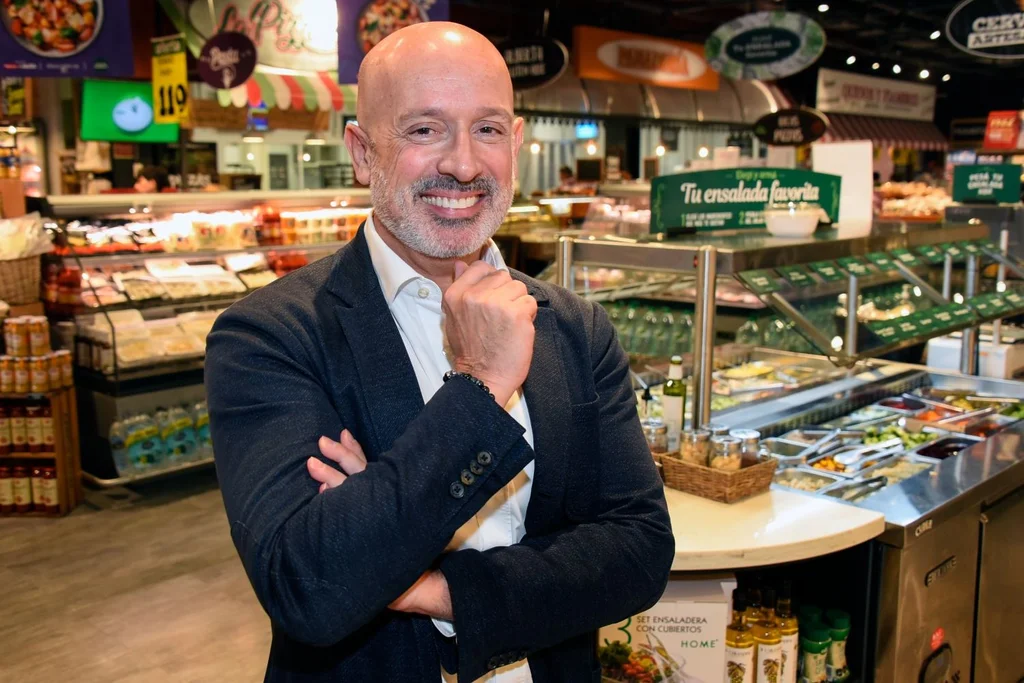It was the month of January 1960 when the first supermarket in Uruguay was installed on Scosería street. More than 60 years later, the number one Disco is still there, but it is not the same, it was traversed by innovation and now sports a renewed image based on one of Grupo Disco’s most recent bets that will even cross the pond to Argentina: Fresh Market .
Behind the local history there are also the offices of Grupo Disco Uruguay (GDU). There Jean Christophe Tijeras, CEO of the group, spoke with Coffee & Business about the main bets of the company that invests about US$ 20 million a year in Uruguay, creates about 6,000 direct jobs and more than 25,000 indirect ones.
The CEO born in Nice, France, worked for the first time in Uruguay in 2010 at Geant and in 2022 he had to return with his family after spending several years living in Argentina directing the Libertad group (a position he maintains to this day).
In interview with Coffee & BusinessTijeras referred to the supermarket as a thermometer of the economy, spoke of Uruguay as a laboratory to test business models that are later exported and adapted to each country, and also referred to the technological evolution that will soon reach GDU supermarkets in the form of new self-service checkouts that will allow paying with a QR code and even with facial recognition.
Below is a summary of the exchange between the CEO of Grupo Disco Uruguay and Coffee & Business.
How was your first year at the helm of Grupo Disco Uruguay (GDU)?
There was a transformation work in GDU, I supported myself in my teams to make this transformation as I intended. The focus is on streamlining all processes. We are not done yet, we have about six more months left, it is an internal transformation. Externally, you can only see the Fresh Market, but little by little you will see other things.
At the consumer level, it has been seen that the Fresh Market brand came to the fore. Where are the other innovations going to come from?
We have a goal. We are market leaders and that helps us to specify the innovations we want to make. GDU does not buy (market)share (market share), our focus is innovation and simplifying the lives of our customers, that’s why we made the Fresh Market.
When I say that we are the market leader it is because we are the first private company in Uruguay, we have more than 6,500 collaborators and 25,000 indirect jobs. Despite being a leader, when we put in the same bag all the supermarkets that exist in the country, those that are in the Association of Supermarkets, we only represent a third of the supermarkets.
We address the issue of innovation to simplify the products so that life is easier for the customer. We travel a lot to bring new ideas and when we arrive we make a Uruguayan sauce, so that it is suitable for what the local client is expecting. This is seen, for example, in cut fruits and sourdough pizzas. This last case is an example, we recently had sourdough pizza and it is in 22 of the 90 stores. Today we sell five sourdough pizzas for every frozen pizza, that is innovation and with great acceptance.
New sales channels and modes have emerged in recent years, such as online and convenience stores. What is Disco’s strategy to compete in these verticals?
We are in full development of e-commerce. Before June we are going to open two stores only for home delivery, they are not open to the public. With that we are going to position ourselves in Montevideo to have a quick response for our clients. We work with our business partner which is Rappi and we also have our own Devotoya fleet. We are in full development from our new Business Intelligence management.
Is this online transformation reflected in the demand? Is this channel more accepted?
We take orders not only online, but we also have many customers who call by phone. Yes, there is a development in demand, but it is not the development that is seen in the world and that we saw in the pandemic with very high growth. It’s still minor, we’re consolidating to develop that, but we don’t see it as the future. It will accompany, but we still focus on the client having an experience when he comes to the Fresh (Market), for example. In this experience is where our path is.
What percentage chooses to buy online?
It is 4%. We have it, we develop it and we accompany it, but it is not yet mature, it is not our heart. Our heart is to be day by day accompanying our clients.
As Fresh Market is gaining a presence in its own right, is it possible that there are new business units breaking away from the ones we already know?
Yes. The first experience was in Manantiales and José Ignacio, which is like our laboratory where we did the 200m² Fresh Market, that’s a gem, it’s spectacular. We made another 64m² in the heart of José Ignacio. Next to Manantiales we have a 150m² Home, they are two different businesses and we have a very nice experience with this development; We think that it is a path to follow and we have various plans.
Surely we are going to open two or three more this year, but bigger ones.
In Montevideo?
Maybe.

Ines Guimaraens
Jean Christophe Tijeras, CEO of Grupo Disco Uruguay
The supermarket is a thermometer of the country’s economic situation. How has the billing been for the last year compared to previous years?
At least we got to inflation, which is our fight, and it’s not something easy. We grew at the same level as Uruguayan inflation.
Is the fact that there has not been a full wage recovery reflected in consumer trends?
Yes, it depends on the location of the supermarkets. To answer our customers we have Leader Price. We are almost at 300 products in total and we are pushing to have even more. This is precisely to give our customers in all categories a reference product with a good price and very good quality. We have 175 consumer products and now we are developing non-food and perishable products.
Along these lines, there was also a change of image and name of what was previously known as Leader Price and is now Precio Líder. Do you have a goal as to how many products you want to have under this label?
Yes, there is a goal: a product in each category of consumer products such as rice or pasta, that is, more than 300 products only in this type of product and also grow in non-food.
At the user level, changes have been seen in logistics when making purchases, the most visible being that of self-service checkouts. Are there changes in the same direction?
Yes, I think that before June we will have the new ones self checkout (car boxes) they are friendlier. I developed the first ones that existed in Uruguay together with Informática for Devoto supermarkets in 2010, the first one that had it was Devoto Portones in 2013 or 2014, but now it is 10 years old. So yes, it will be a much friendlier screen with easy recognition, we are working on this and we take it so that you can pay or with QR or facial recognition, we have to see what the DGI allows us, if you are authorized to pay with this type of technology. We are in this development and also with conventional boxes, we change the printers so that they are much faster and the customer does not waste time at the box. They are in transit, in June they are already launched, you just have to wait for the ship.
What acceptance did you see from the public before this method of payment?
Very good acceptance. There are supermarkets that reach 40% of the customers who go through the checkout counters, in other 60% of the customers go through these checkout counters.
It depends on the number of products you have. If they have 10 products or less, they go to the delf checkout.
We are in the heart of the city in Montevideo and we see that clients come very frequently, they like the practical ones because it is faster. They are smaller and more followed purchases.
A few days ago they carried out an award for their suppliers. How important are they for Grupo Disco?
For us it is essential to develop products together with our business partners, with good practices. There is a good practice protocol with them that benefits the client, which is why we recognize our business partners with prizes. We started it last year and we did it again in the last few days, more than 365 providers signed up and there are 31 awards. This allows us to reinforce the joint work to benefit the client in better prices, better packaging. The benefit is always for the customer.
Is it a priority for the group to have Uruguayan suppliers?
Absolutely, it’s a priority. I am interested in Uruguayan entrepreneurs with Uruguayan products, that is what we want to develop. Later we can export your product to Argentina or Brazil, but first we develop it here.
How many stores does the group have in Uruguay?
Today 90 stores, adding the supermarkets that are 55, the Devoto Express, the Fresh Market and the Geant hypermarkets.
Is there room to continue growing in Uruguay?
Yes, there is room to continue growing, but we are not interested in growing for the sake of growth. If we see a need at a particular point, we are interested there, but we don’t want to be there just to be there.
There is always talk of foreigners investing in Uruguay, but there are many Uruguayan companies that invest every year and GDU is one. We invest each year more than US$ 20 million. With that we remodel premises, we change the cold of the refrigerators to a cold with CO2, we are the first supermarkets to do so and this type of cold is 1,300 times less polluting than other gases. All this contribution that we make as an investment is important for the community. We have plans to reduce energy consumption, by the end of 2024 we will have all the refrigerators with doors and in these investments we also change, for example, the plastic packaging to a 100% recyclable one that dissolves with water. We are making investments with great pride.
Can you grow abroad from Uruguay?
We are going to open a Fresh Market in Buenos Aires. What is consolidated in Uruguay we can export, we do a lot of synergy with Argentina, Brazil and Colombia and Uruguay is our laboratory; We already started to export everything we know how to do. Then the others have to adapt the model to the Colombian or Brazilian salsa to have their local touch.















